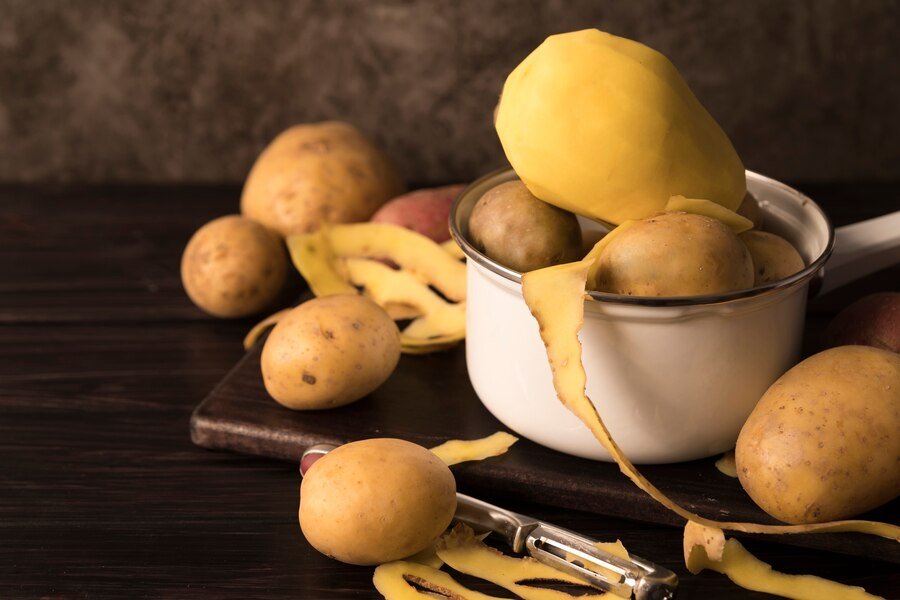Nutritionist Kerry Torrens explores the health benefits of potatoes and their place in a nutritious diet, providing recipe inspiration.
Registered Nutritionist Kerry Torrens explores why one family favorite represents more health advantages.
What Are Potatoes ?

Potatoes (Solanum tuberosum), part of the nightshade family that includes tomatoes and aubergines, serve as an underground energy store known as tubers for plants in this family. There is an immense variety of types of potatoes; culinary experts often classify them into three main groups – floury varieties; waxy ones and new potatoes.
Floury potatoes like Maris Piper contain amylose starch granules which, when cooked, expand and burst open, creating an airy surface suitable for delicate yet smooth pounding. Waxy varieties like Charlotte contain less amylose; thus creating firmer cooked surfaces which work well when broiling or making gratins. New potatoes, on the other hand, hold their shape better during this process and are therefore perfect for potato salads.
Nutritional Benefits

A medium piece (175g) of boiled potatoes (flesh and skin) gives:
- 119kcal/509kJ
- 3.1g protein
- 0.2g fat
- 26.1g starch
- 1.9g sugar
- 3.1g fiber
- 12mg vitamin C
What you plan and cook potatoes to be will have an impactful effect on their nutritional value. Cooking whole in their skins provides fiber as well as essential minerals like potassium, magnesium, zinc and iron; though vitamin C levels decrease while carotenoids and polyphenol levels rise during processing. Broiling, browning or adding cream will increase fat and carb levels of your dish further.
Traditional potatoes don’t count towards our five-a-day commitment, since we typically think of them as filler on our plates to replace other sources like pasta and rice. They’re also often associated with high-fat diets; find out more with the help of our handy infographic about what constitutes one of your five-a-days!
Top 5 Health Benefits Of Potatoes
- Nutritional Incentive For Cash
Potatoes provide a more beneficial cost/benefit ratio than many other vegetables and are an essential staple around the world. In Britain’s diet alone, they contribute towards our daily requirement of vitamin C, potassium, B6 folate and fiber intake. As world populations increase rapidly with less land available to cultivate crops like these quickly providing food quickly on less land.
- Low In Fat
Many individuals and health experts tend to look down upon potatoes; however, when properly cooked and consumed they are virtually fat free. Tubers provide ample amounts of starch while offering significantly fewer calories than pasta or rice dishes of comparable volume. Furthermore, unlike these grains they also contain helpful micronutrients such as vitamin C, folate and potassium that contributes to overall wellbeing.
Potatoes contain relatively few proteins, yet what little they do provide offers excellent organic value – offering a broad spectrum of essential amino acids necessary for overall good health.
- Supports Stomach Health
As well as providing us with essential fiber, the starch found in potatoes can also aid our stomach microorganisms by providing safe starch which cannot be digested directly by us but instead breaks down easily by microbes in our stomach, providing them with nourishment they require to flourish and grow.
Once we cook and cool potatoes, their starch granules become less readily assimilable by our bodies. According to studies, when we choose food sources rich in safe starches we experience numerous health benefits – more productive absorption, decreased risk for some chronic diseases and lower colon cancer risk are among them.
- May Support Blood Sugar Management
Potatoes contain safe starch that may help control blood sugar and curb cravings. Animal studies have linked safe starch from potatoes with improved insulin responsiveness, lower fat accumulation and less weight gain; furthermore a review on 30 grams per day over an 8 week time span revealed this to be replicated among healthy individuals. You can increase their safe starch content further by cooking, cooling and storing in the fridge prior to consumption.
Potatoes are also an excellent source of gelatin fiber, which helps alleviate back stomach bloating and keep you full for longer while simultaneously helping lower the blood-sugaring effects of meals.
- Source Of Protective Antioxidants
Potatoes are an invaluable source of antioxidant-rich plant compounds that provide protective benefits to our bodies. Their flesh provides carotenoids such as lutein and zeaxanthin which have multiple eye benefits, in addition to polyphenols like chlorogenic acid as well as flavonoids like catechin and epicatechin that benefit them in many ways.
Are Potatoes Ok For Everybody ?

Potatoes are generally considered safe for consumption by most individuals; however, under certain circumstances some may be sensitive to raw and cooked potatoes. If this happens to you, additional Solanaceae family plants such as tomatoes, bell peppers and aubergines may also trigger your sensitivity.
Potatoes contain glycoalkaloids such as solanine that can be toxic if consumed in excess. When purchasing potatoes for preparation or storage purposes, pay special attention to any patches of green on their skin which indicate higher concentrations of glycoalkaloids; remove these parts before cooking to minimize accumulation. Keep potatoes in cool, dark storage conditions to reduce accumulated glycoalkaloids.
Also Read: 10 Tips To Help You Live Longer With Better Health


